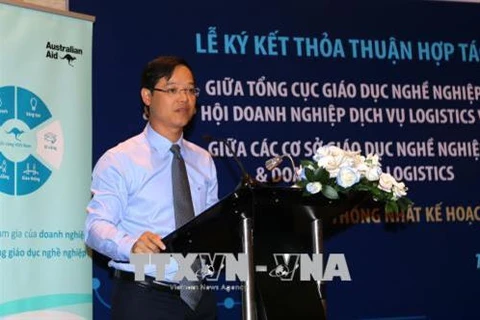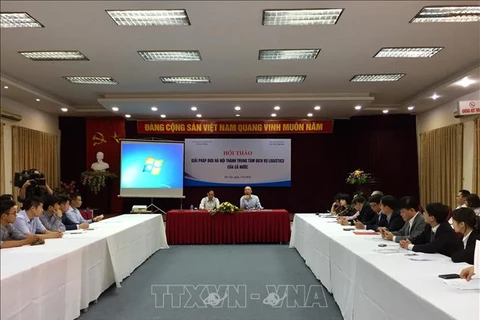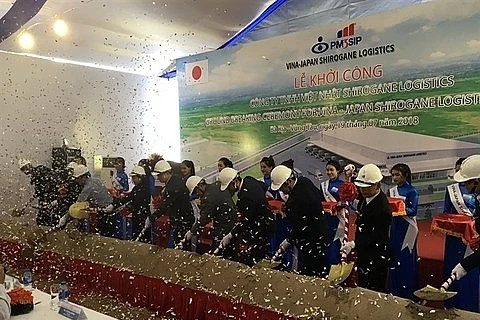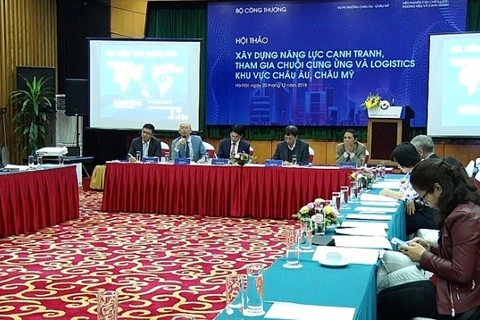Hanoi (VNA) - Logistics, considered an industry with huge contributions to the development of the economy, has not lived up to its potentials due to human resources shortage.
There are about 300,000 enterprises involved the logistics sector, with a workforce of around 1.5 million, according to the Vietnam Supply Chain Association.
However, this labour force only meets about 40 percent of the demand of the industry.
At a recent international seminar in Hanoi on training and developing logistics human resources in Vietnam, experts expressed concerns that logistics personnel is still in short supply, not to mention their low qualifications and a lack of professionalism.
Associate Professor Trinh Thi Thu Huong, from the Foreign Trade University, said Vietnam is considered a country with advantageous natural conditions and a convenient geographic location to develop logistics services. However, this industry has not really developed and contributed insignificantly to the national GDP as it should have.
"One of the causes of the situation is human resources which are not only in low quantity but also have limited professionalism," she was quoted as saying by Thoi Bao Kinh Te (Economic Times).
A survey by the HCM City Research and Development Institute on the quality of logistics human resources revealed that 53.3 percent of enterprises lack qualified staff who possess good knowledge of logistics, 30 percent of firms have to train their employees and only 6.7 percent of businesses are satisfied with the expertise of their staff.
The survey also revealed 80.26 percent took part in training courses, 6.9 percent were being trained by foreigners and only 3.9 percent were trained abroad.
According to Associate Professor Ta Van Loi, from School of Trade and International Economics, there are several reasons for the shortage of qualified workforce in logistics.
“Enterprises lack initiatives to access the labour market, and do not have long term recruitment plans. They only recruit when they need to and job requirements are unclear.”
“The logistics companies have not offered suitable levels of salaries, bonuses and other preferential conditions, which failed to motivate labourers to cultivate their skills,” Loi said.
On the part of employees, they lack information on orientation and career development, failing to upgrade their skills after graduated.
In order to have high quality labourers, companies need to have periodic training programmes and improve the quality of training by strengthening cooperation among businesses, universities and associations, Huong suggested.
Businesses also need to consider setting up human resources development funds as well as cooperation with other companies in training and recruitment because most of the Vietnamese firms are still financially weak.
More attention should be paid to improving the quality of the working environment and more incentives should be offered to employees to encourage them to take more responsibilities in their work, Huong said.
Dr Nguyen Duc Diep, deputy general director of KOSY Group, emphasised the need to develop logistics training programmes quickly, putting logistics staff into compulsory undergraduate courses.
There are three forms of logistics training: university, vocational schools, associations and businesses. Statistics show Vietnam has 15 logistics training establishments. However, the number of teachers is insufficient.
During the 2017-20 period, the country needs roughly 20,000 high-quality workers meeting professional requirements, including adequate command of English language, and the number is expected to surge to 200,000 by 2030.-VNA
There are about 300,000 enterprises involved the logistics sector, with a workforce of around 1.5 million, according to the Vietnam Supply Chain Association.
However, this labour force only meets about 40 percent of the demand of the industry.
At a recent international seminar in Hanoi on training and developing logistics human resources in Vietnam, experts expressed concerns that logistics personnel is still in short supply, not to mention their low qualifications and a lack of professionalism.
Associate Professor Trinh Thi Thu Huong, from the Foreign Trade University, said Vietnam is considered a country with advantageous natural conditions and a convenient geographic location to develop logistics services. However, this industry has not really developed and contributed insignificantly to the national GDP as it should have.
"One of the causes of the situation is human resources which are not only in low quantity but also have limited professionalism," she was quoted as saying by Thoi Bao Kinh Te (Economic Times).
A survey by the HCM City Research and Development Institute on the quality of logistics human resources revealed that 53.3 percent of enterprises lack qualified staff who possess good knowledge of logistics, 30 percent of firms have to train their employees and only 6.7 percent of businesses are satisfied with the expertise of their staff.
The survey also revealed 80.26 percent took part in training courses, 6.9 percent were being trained by foreigners and only 3.9 percent were trained abroad.
According to Associate Professor Ta Van Loi, from School of Trade and International Economics, there are several reasons for the shortage of qualified workforce in logistics.
“Enterprises lack initiatives to access the labour market, and do not have long term recruitment plans. They only recruit when they need to and job requirements are unclear.”
“The logistics companies have not offered suitable levels of salaries, bonuses and other preferential conditions, which failed to motivate labourers to cultivate their skills,” Loi said.
On the part of employees, they lack information on orientation and career development, failing to upgrade their skills after graduated.
In order to have high quality labourers, companies need to have periodic training programmes and improve the quality of training by strengthening cooperation among businesses, universities and associations, Huong suggested.
Businesses also need to consider setting up human resources development funds as well as cooperation with other companies in training and recruitment because most of the Vietnamese firms are still financially weak.
More attention should be paid to improving the quality of the working environment and more incentives should be offered to employees to encourage them to take more responsibilities in their work, Huong said.
Dr Nguyen Duc Diep, deputy general director of KOSY Group, emphasised the need to develop logistics training programmes quickly, putting logistics staff into compulsory undergraduate courses.
There are three forms of logistics training: university, vocational schools, associations and businesses. Statistics show Vietnam has 15 logistics training establishments. However, the number of teachers is insufficient.
During the 2017-20 period, the country needs roughly 20,000 high-quality workers meeting professional requirements, including adequate command of English language, and the number is expected to surge to 200,000 by 2030.-VNA
VNA

























